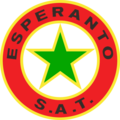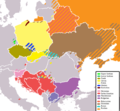Esperanto and Ido are constructed international auxiliary languages, with Ido being an Esperantido derived from Esperanto and Reformed Esperanto. The number...
50 KB (4,902 words) - 04:52, 19 December 2024
Ido (/ˈiːdoʊ/) is a constructed language derived from a reformed version of Esperanto, and designed similarly with the goal of being a universal second...
58 KB (5,272 words) - 17:41, 10 May 2025
blocada. By comparison, all words in Esperanto take on a characteristic Esperanto form. In this case, the Interlingua blocada and the Esperanto blokado are...
21 KB (2,101 words) - 08:25, 23 April 2025
committee from Reformed Esperanto, whereas Interlingua was developed from scratch by an American organization, the IALA. Ido is what is called schematic...
7 KB (343 words) - 17:10, 21 April 2025
more analytic in its grammar than Ido, and, in Jespersen's view, more natural. Comparisons among Ido, Novial, and other notable international auxiliary...
8 KB (450 words) - 16:37, 21 October 2024
in 1894 and Ido in 1907. Several later constructed languages, such as Universal, Saussure, Romániço, Internasia, Esperanto sen Fleksio, and Mundolingvo...
143 KB (14,129 words) - 01:38, 19 May 2025
Esperanto and Novial are two different constructed international auxiliary languages. Their main difference is that while Esperanto is a schematic language...
18 KB (1,296 words) - 08:20, 23 April 2025
Esperanto Esperanto words with the infix -um- Esperanto profanity Comparison between: Esperanto and Ido Esperanto and Interlingua Esperanto and Novial Gender...
9 KB (727 words) - 18:01, 26 April 2025
Ric Berger (section Ido)
languages as an Esperantist. Berger began to support Ido in 1918 after six years with Esperanto. Berger's activities with Occidental began in 1928, when...
6 KB (607 words) - 20:09, 21 October 2023
constructed languages proposed to ease international communication, such as Esperanto, Ido and Interlingua. It usually takes words from widely spoken languages....
58 KB (6,073 words) - 12:09, 22 April 2025
languages like Ido and naturalistic languages like Occidental to aid it in deciding on which language model to adopt. Both Occidental-Interlingue and Interlingua...
17 KB (1,210 words) - 16:47, 29 November 2024
The original word base of Esperanto contained around 900 root words and was defined in Unua Libro ("First Book"), published by L. L. Zamenhof in 1887...
63 KB (5,595 words) - 01:26, 22 April 2025
Interlingua (redirect from Interlingua and Eligibility of International Words)
Interlinguistics Comparisons with other languages Comparison between Esperanto and Interlingua Comparison between Ido and Interlingua Comparison between Interlingue...
60 KB (5,996 words) - 23:10, 19 May 2025
Esperanto is the most widely used constructed language intended for international communication; it was designed with highly regular grammatical rules...
67 KB (8,972 words) - 05:26, 8 April 2025
were living outside of Europe) and demanded a response in one month. Esperantido Comparison between Esperanto and Ido Document sans titre Archived 2016-03-03...
8 KB (1,037 words) - 12:33, 14 May 2025
Sennacieca Asocio Tutmonda (category CS1 Esperanto-language sources (eo))
and others as an organisation of the workers' Esperanto movement. It was the largest and most active between the two World Wars. At its high point in 1929-1930...
9 KB (1,178 words) - 21:05, 7 January 2025
Novial (category Articles containing Ido-language text)
his surname with Esperanto, the prototypical auxiliary language. Comparison between Esperanto and Novial Comparison between Ido and Novial Only used on...
23 KB (1,818 words) - 21:46, 31 March 2025
Hermann Alfred Tanner (category CS1 Esperanto-language sources (eo))
of various international auxiliary languages, supporting Volapük, Esperanto, Ido and finally Occidental (later Interlingue) at various points. Tanner was...
22 KB (2,176 words) - 16:36, 10 March 2025
Eugène Lanti (category Esperanto lexicographers)
driver. He learnt Esperanto in 1914–15 at the Western Front, but in 1919 was almost persuaded to abandon Esperanto in favour of Ido. Following the war...
5 KB (587 words) - 10:12, 28 March 2025
Wede (category CS1 Esperanto-language sources (eo))
grammatical and orthographic simplifications. Baumann's languages received a largely negative reception, being mocked by members of the Esperanto and Ido communities;...
39 KB (3,536 words) - 12:01, 21 October 2024
Alphonse Matejka (category Articles containing Ido-language text)
national Swiss Ido society (Ido: Suisa Ido-Societo). Matejka worked with Ido periodicals such as Suisian Idisto and Ido-Kuriero, and was the editor of...
15 KB (1,500 words) - 00:24, 22 March 2025
Heinrich Nidecker (category CS1 Esperanto-language sources (eo))
movement, supporting Ido and later Interlingue; he authored several works in the latter. Nidecker also wrote on topics of social reform, and on the history...
10 KB (917 words) - 00:24, 22 March 2025
Inflection (section Ido)
such as Lingua Franca Nova, Glosa, and Frater, have no inflection. Other auxiliary languages, such as Esperanto, Ido, and Interlingua have comparatively simple...
63 KB (6,185 words) - 04:08, 8 April 2025
Interlingue (category Articles containing Esperanto-language text)
stylized letters, a star (as in Esperanto and Ido), a setting sun to represent the sun in the west (the Occident), a globe, and more. The tilde, already used...
133 KB (12,584 words) - 07:02, 5 May 2025
as a pan-Slavic language, but also to compete with languages like Esperanto and Ido as a global international auxiliary language. Most of its vocabulary...
43 KB (5,399 words) - 23:26, 17 May 2025
'Be content!' if s is between vowels, it can be pronounced [z], like in "these" (instead of the [s] of "stay") if x is between vowels, it can be spoken...
7 KB (591 words) - 12:58, 13 February 2021
7-Zip (section Reception and usage)
speed, ratio, and size and awarded the software the 2013 Tom's Hardware Elite award. Free and open-source software portal 7z Comparison of archive formats...
24 KB (2,367 words) - 19:00, 17 April 2025
Languages of science (section French, English, German and the quest for an auxiliary language (1800–1920))
lack of scientific purpose and technical vocabulary. Unexpectedly, the Delegation supported a new variant of the Esperanto, Ido, which was submitted very...
82 KB (10,491 words) - 22:56, 8 April 2025
problem of an international language and which recommended Esperanto with reforms (leading to the language known as Ido), occurred in 1907 before Occidental...
84 KB (8,339 words) - 20:19, 9 May 2025
English (Received Pronunciation) English (Scottish) English (West Midlands) Esperanto Estonian Finnish French (Belgian) French (Canada) French (France) Georgian...
20 KB (1,707 words) - 01:40, 15 May 2025

















